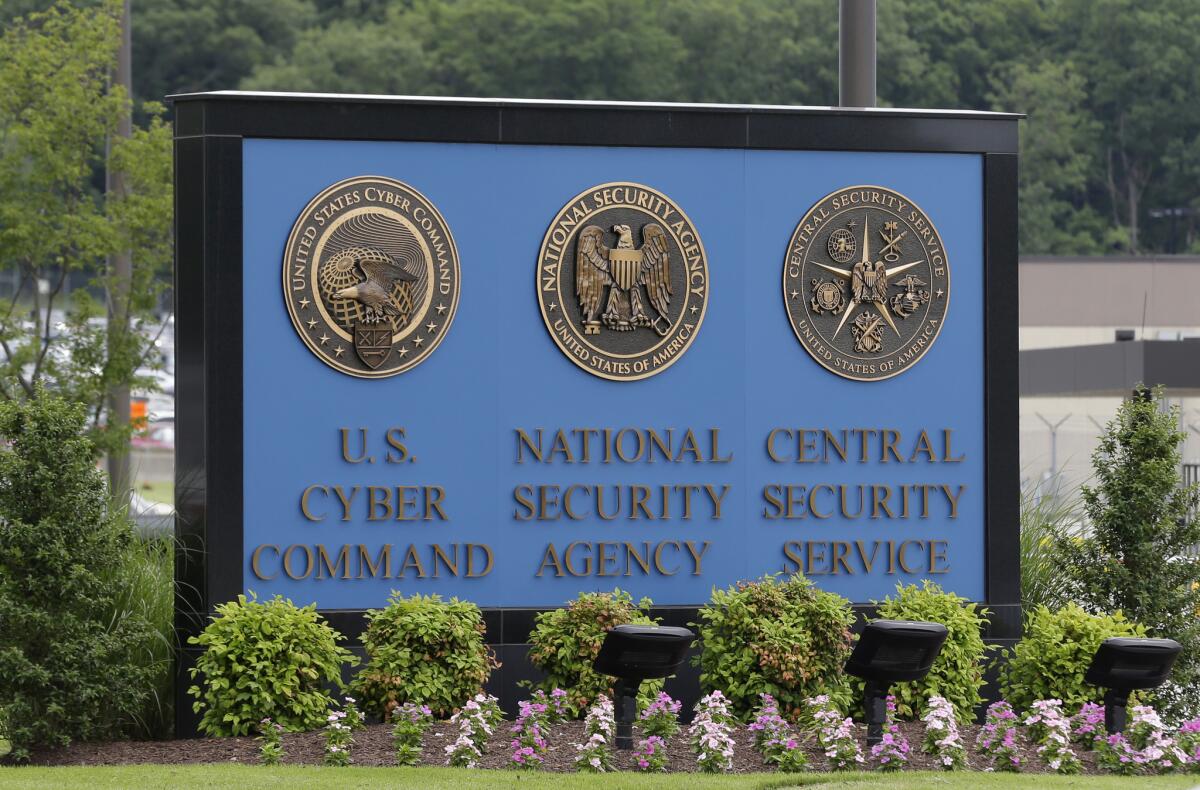House bill targets NSA’s power to hold phone data

A bill that the House is expected to pass would leave customers’ toll records with telephone companies, not the National Security Agency.
The House is poised to pass a bipartisan bill Wednesday intended to dial back the once-secret National Security Agency program that collects and stores Americans’ telephone data and that a federal appeals court has ruled is illegal.
The proposed reform bill would leave customers’ toll records with telephone companies, not the NSA. The government would need a court order to access specific records for terrorism or espionage investigations.
The Obama administration is backing the House bill, which is expected to draw Republican and Democratic majorities, as a compromise that protects privacy and civil liberties while preserving the government’s ability to track terrorism suspects and their contacts.
But it sets up a conflict with GOP leaders in the Senate. They are backing a bill to renew the controversial NSA program through 2020 either unchanged or with minor amendments.
The dispute has taken on urgency because the provision in the USA Patriot Act used to justify the NSA’s bulk collection of phone records expires on June 1. If lawmakers fail to act by then, the program presumably will end.
Driving the debate is the decision last week by the U.S. 2nd Circuit Court of Appeals, which ruled that the NSA had far exceeded its authority by collecting the call data of hundreds of millions of people who were not specific targets. It did not order the program stopped, however, because of the likelihood of congressional action.
The debate comes amid heightened government concerns about the possibility of terrorist attacks inside the U.S. inspired by Islamic State militants in Syria and Iraq.
The House bill, called the USA Freedom Act, would stop the NSA from storing domestic telephone toll records – the times, duration and numbers dialed or received of every landline and cellphone call.
Phone companies are required to keep customer toll records for at least 18 months under a Federal Communications Commission regulation. That rule will remain, so the NSA will have 18 months to seek permission from the Foreign Surveillance Intelligence Court to seek data held by companies.
The proposed bill also creates a panel of independent advocates at the FISA court for the first time to argue on matters of privacy and civil liberties. The court, which meets in secret, now hears only from government lawyers.
Supporters of the House bill say it also would prohibit the NSA from indiscriminate collection on a smaller scale, such as requests for all calling records from a city, state or ZIP Code.
It also would allow companies and individuals, for the first time, to challenge the gag orders that routinely come with data demands from the government under so-called national security letters.
The administration has always argued that the bulk collection of phone data, which began under President Bush after the Sept. 11, 2001, terrorist attacks, is legal. But a public outcry forced President Obama to call for moving the records out of government control after former NSA contractor Edward Snowden revealed the program’s existence in 2013.
House leaders predicted easy approval of the reform bill.
“Oh, I think it will pass overwhelmingly,” House Majority Leader Kevin McCarthy (R-Bakersfield) said Tuesday on Fox News.
The path in the Senate is far less clear. Senate Majority Leader Mitch McConnell (R-Ky.) told reporters that the GOP leadership is “going to try to do something” to prevent the NSA program from expiring on June 1.
“I think, most likely, the outcome is some kind of extension,” McConnell said. “But it will be open for amendment whenever we’re able to really fully turn to it.”
Sen. Rand Paul (R-Ky.), who is running for the Republican presidential nomination, is a staunch opponent of the NSA program. He has said he will filibuster if the Senate is asked to renew the bill without changes. Sen. Ron Wyden (D-Ore.), who also has fought to end the NSA program, has vowed to filibuster as well.
Sen. Harry Reid of Nevada, the Senate’s top Democrat, wants the chamber to vote on the House bill, or take up similar legislation introduced by Sens. Mike Lee (R-Utah) and Patrick J. Leahy (D-Vt.).
“Why would anyone agree to reauthorize a program which our circuit courts deem to be illegal?” Reid said Monday on the Senate floor.
Lee warned that the NSA program could be used to punish political enemies and silence dissent. “It is not a question of if these powers will be abused, it is a question of when,” he said Tuesday on the Senate floor.
Leahy recalled how J. Edgar Hoover, in his 37 years as FBI director, collected intelligence, often from phone taps, on politicians, journalists, civil rights leaders and others. “What if a J. Edgar Hoover had the kind of tools available today?” Leahy said Tuesday.
U.S. officials have said the NSA database helped crack numerous terrorism plots. Only one case has been publicly identified in which call records proved crucial: four San Diego men who were convicted of aiding Shabab militants in Somalia in 2008.
The group was discovered after the NSA turned up a number in Somalia used by a Shabab leader and the agency used the database to trace calls to one of the men in San Diego. The FBI got a court order to wiretap his phone, and learned he had sent the group $8,500.
The House passed a similar reform bill last year, but the Senate failed to take it up. In September, then-Atty. Gen. Eric H. Holder Jr. and Director of National Intelligence James R. Clapper expressed their support in a letter to Leahy.
The legislation “preserves essential… capabilities” and is a “reasonable compromise that enhances privacy and civil liberties and increases transparency,” they wrote. “Overall, the bill’s significant reforms should provide the public greater confidence in our programs and the checks and balances in the system.”
The current House bill increases some government authority.
One provision would allow the NSA to continue tracking a foreign suspect for 72 hours after he or she enters the U.S. if a lapse in surveillance would pose “a threat of death or serious bodily harm.” Normally, the FBI takes over foreign intelligence targets once they step on U.S. soil.
The bill also would increase from 15 years to 20 years the maximum prison sentence for individuals convicted of providing material support for terrorism.
Twitter: @ByBrianBennett
More to Read
Start your day right
Sign up for Essential California for news, features and recommendations from the L.A. Times and beyond in your inbox six days a week.
You may occasionally receive promotional content from the Los Angeles Times.







